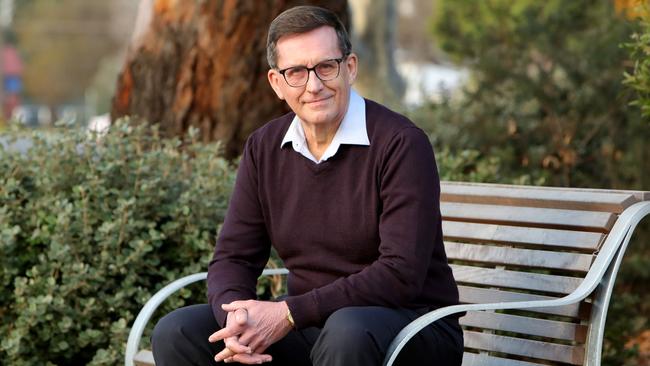RBA’s Harper backs review, says Australian central bank won’t follow US Fed on interest rate hikes
RBA’s Ian Harper says the central bank won’t follow the US on hikes, and the market is reading too much local relevance into Fed moves.

A detailed review of the Reserve Bank of Australia’s operation of monetary policy would be welcome, allowing the central bank to freely answer critics about its failure in recent years to achieve its inflation target, said Ian Harper, Dean of Melbourne Business School.
Mr Harper, who doesn’t speak on behalf of the RBA but is a member of its policymaking board, said separately that financial markets are misguided in thinking Australia’s central bank will follow the US Federal Reserve when raising interest rates, adding that the RBA has good reasons to wait.
If the RBA’s operations were to be reviewed, Mr Harper said the terms of reference should include the question of whether the 2-3 per cent inflation target, the cornerstone of monetary policy for nearly 30 years, is too high or too low.
“I would welcome the opportunity for an inquiry into monetary policy and the lessons we’ve learned. These things are healthy,” he said.
“What it would allow the bank to do is to put its side of the story. For the first time, it would be able to look back over the period and talk about the full picture,” Mr Harper told The Wall Street Journal on Wednesday.
Treasurer Josh Frydenberg in January said he is committed to a broadbased, independent review of the RBA after the coming federal election. He has the backing of leading economists, while the opposition Australian Labor Party has also indicated it would pursue a review if it wins the election.
RBA Governor Philip Lowe said in November that the effectiveness of the central bank’s policy choices during the pandemic, which included a three-year yield target and a government bond-buying program, will be put under the microscope internally this year.
The Organisation for Economic Cooperation and Development has also backed a review of the RBA, arguing that not only should its overall mandate be examined but also its board structure, and its process of communicating with markets and the public.
“The real issue is to make sure that the institution and its policy making has the confidence of the people,” Mr Harper said. “An inquiry like that would open up those doors. Then the bank could explain itself.”
Australia’s inflation rate recently returned to the desired target band after an absence that stretched back to the middle of the past decade.
Still, there should be limits to the inquiry, as the processes that drive the RBA’s decision making are generally working well, Mr Harper said.
“Where I think the problem would arise is if people decided that they want to open up the Reserve Bank Act and change a whole bunch of things,” he said.
While acknowledging that he currently sits on the board, Mr Harper said the current RBA board structure, which includes five people from business backgrounds and four economists, works well.
“The notion that there are more experienced business, senior people, on the board than there are professional economists, is right. The last thing we need is decisions being made by a bunch of technocrats. You may as well have a machine do it, if that’s the case,” he said.
On interest rates, Mr Harper said Australia’s inflation outlook is far more benign than that of the US, so the pricing of a similar upward trajectory for interest rates is likely to be an error in judgment.
Financial markets currently expect six interest-rate increases in the US this year and five in Australia.
“The market is reading a whole lot more of the American situation to being relevant to our situation, than what the bank is doing,” Mr Harper said.
Given all the recent communication, “there is no mystery” as to why the bank is signalling it will remain patient.
With full employment within reach, “why would you want to stop” doing what you are currently doing, he said.
Inflation needs to be returned sustainably to the 2-3 per cent target band before interest rates rise, and that could take time.
The nonaccelerating inflation rate of unemployment, or NAIRU, might well be falling, he said.
Mr Harper highlighted the situation in Western Australia, where unemployment has fallen sharply, yet its borders remain closed.
In that “pressure cooker” you would expect wages and inflation to be rising faster than the rest of the country, but they aren’t.
The RBA has time, he said.
“We are not talking about forecasts, we are talking about actual (data outcomes),” Mr Harper said. “The whites of the eyes.”
The Wall Street Journal



